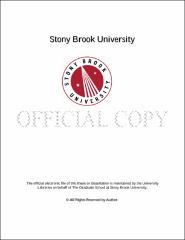| dc.identifier.uri | http://hdl.handle.net/11401/77569 | |
| dc.description.sponsorship | This work is sponsored by the Stony Brook University Graduate School in compliance with the requirements for completion of degree. | en_US |
| dc.format | Monograph | |
| dc.format.medium | Electronic Resource | en_US |
| dc.language.iso | en_US | |
| dc.publisher | The Graduate School, Stony Brook University: Stony Brook, NY. | |
| dc.type | Dissertation | |
| dcterms.abstract | This dissertation contributes to post-secularist histories of the long eighteenth century, its literary contexts, and the political history of women by examining the intersections of feminist and religious themes in narratives about motherhood. In literary scholarship, post-secularism asks us to reassess the importance of religious faith and religious institutions in past societies and their literature. The eighteenth century, long coterminous with Enlightenment secularism, is a particularly crucial moment for revisionist approaches to the literary history of the West. While important work has been done on the religious foundations of early feminism and the political history of motherhood, this study is the first to focus on the spiritual conflicts of mothers as part of a larger discourse of religio-political freedom. Fictions by John Bunyan, Daniel Defoe, Samuel Richardson, Frances Sheridan, Mary Wollstonecraft, and others register anxieties about the possibilities of belief or unbelief that destabilize codes of maternal behavior within a family or a society. Reading novels as fictions, as spiritual progresses, and as sites of ontological contest between the spiritual and the secular, this dissertation explores the ways in which novels mediate between religious-feminist and paternalist codifications of motherhood. When they dramatize conflicts between various types of Christian motherhood and authoritarian forces, novels put ideologies of motherhood into dialogue with feminist tracts, spiritual autobiographies, conduct literature, sermons, and radical polemics. In the process, they illuminate the cruxes of religious debate in the Enlightenment, and, frequently, imagine radical reformations of domestic and political power structures. | |
| dcterms.available | 2017-09-20T16:52:55Z | |
| dcterms.contributor | Pfeiffer, Douglas | en_US |
| dcterms.contributor | Hutner, Heidi | en_US |
| dcterms.contributor | Markley, Robert. | en_US |
| dcterms.contributor | Munich, Adrienne | en_US |
| dcterms.creator | Marie, Nicole Garret | |
| dcterms.dateAccepted | 2017-09-20T16:52:55Z | |
| dcterms.dateSubmitted | 2017-09-20T16:52:55Z | |
| dcterms.description | Department of English. | en_US |
| dcterms.extent | 270 pg. | en_US |
| dcterms.format | Application/PDF | en_US |
| dcterms.format | Monograph | |
| dcterms.identifier | http://hdl.handle.net/11401/77569 | |
| dcterms.issued | 2015-12-01 | |
| dcterms.language | en_US | |
| dcterms.provenance | Made available in DSpace on 2017-09-20T16:52:55Z (GMT). No. of bitstreams: 1
Marie_grad.sunysb_0771E_12573.pdf: 3240570 bytes, checksum: 88a84a0c2baf91fb8cb796430a55d609 (MD5)
Previous issue date: 1 | en |
| dcterms.publisher | The Graduate School, Stony Brook University: Stony Brook, NY. | |
| dcterms.subject | Motherhood, Novel, Secularism | |
| dcterms.subject | English literature | |
| dcterms.title | Motherhood and Religious Crisis in the English Novel, 1678-1800 | |
| dcterms.type | Dissertation | |

